A MOTHER’S MILK
On May 23, 2017, conflict broke out in Marawi City between the Armed Forces of the Philippines and armed fighters from two ISIL-affiliated groups – Abu Sayyaf and the Maute. This led to a 5-month siege that destroyed most of the city’s central commercial district and forced 350,000 people to evacuate their homes. 5% of the evacuees stayed in evacuation centers while 95% choose to stay with relatives and friends in nearby communities.
The host communities where the evacuees stayed were caught unprepared with the massive influx of people. Food, health, water, sanitation and other basic services for the displaced population were severely compromised. Action Against Hunger personnel were on the ground two days after the conflict started to assess the situation and determine the urgent humanitarian needs of the affected population. Emergency Response projects in Food & Nutrition, Water, Sanitation & Hygiene (WASH), Food Security and Livelihoods, and Shelter started on June 1, 2017 and continues to this day.
These are the voices of the people who endured the Siege of Marawi through resilience and determination.
Idalia Beruar, 33, nursed her 2-month old daughter Queenie while her husband Ibrahim fed their two boys in one of the makeshift living quarters at the gymnasium-turned-evacuation center in Barangay Sta. Elena, Iligan City. After all they had been through, she was glad that all four of them were alive and well.
She was four months pregnant when they fled the armed conflict from Marawi City. They took the route which passed through the forest because gunshots were heard from the highways. The road was rough with rocks and slippery with mud. It took them hours to trek it with one child on her husband’s back and the other one on his arms. The heat and the tedious hike soon made them thirsty. Having brought no water with them, they resorted to drinking from any water source they could find along the path.
It was when they were walking through the municipality of Tagoloan when their 2-year old son Delmar got sick. “He was so pale and he kept on throwing up and had loose bowels. We stopped a car and asked the owner to take us to a hospital because I feared that our son might not last the journey,” she said.
At the Iligan City hospital, the doctor who attended to Delmar saved him from severe dehydration. He was discharged a few days later and joined his family at the evacuation center where they found a space to live in. The experience made Idalia careful on what her children ate and drank.
Fortunately, their first month in the evacuation center fell on the celebration of the holy Ramadan. Cooked food and purified drinking water were donated by their fellow Muslims who were not displaced by the armed conflict.
After that month, they relied mainly on the relief goods from government agencies and other organizations responding to the crisis. However, the food donations were mostly canned goods and instant noodles. Idalia was concerned that, with her being pregnant and her children still less than five years old, they were not getting the right nutrition they needed.
“I suffered from urinary tract infection. Maybe it was because of too much salt intake from the canned goods. My children also got thinner as the days went by,” she shared.
Starting September 2017, Action Against Hunger, with support from the Swedish International Development Cooperation Agency (SIDA), brought food aid kits for pregnant women, lactating mothers and families with children aged less than five years old. Idalia remembered the sack of good quality rice, mung beans, dried fish, fruits and vegetables included among the many items in the food aid kit they received.
“I cooked the mung beans with the dried fish and moringa leaves. My children ate it well with the delicious rice they gave us,” she shared.
She and other pregnant women and lactating mothers were also encouraged by Action Against Hunger personnel to attend a seminar on breastfeeding and infant and children care practices funded by the Spanish Cooperation for International Development (AECID). Idalia pointed out that she had always breastfed her children because they did not like the formula she prepared for them. But in the seminar, she learned that breastmilk is still the most nutritious food for the baby. She and her co-participants were also taught to massage their breasts to produce more milk when the baby is suckling from them.
“I was amazed also that the mothers who trained us brought their babies to the seminar, breastfed them, bathe them and changed their diapers for all of us to see,” Idalia said.
When she delivered her baby Princess on November 2, 2017, Idalia applied what she learned in the seminar and breastfed her baby. She also made it a habit to hydrate with water and vegetable soup. She also maintained taking ferrous sulfate and Vitamin A to keep herself strong and healthy. Today, at two months, Princess weighs six kilos and is always at her mother’s side.
The Technical Education and Skills Development Authority were conducting skills training for livelihood at the evacuation center Idalia’s family was situated. Even though she was taking care of two boys and a newborn, Idalia grabbed the opportunity to sign-up for these courses for livelihood opportunities while they were indefinitely staying at the evacuation center. Having seen the mothers who trained them during the child-care seminar bringing their babies while working, she brought Princess along with her when she attended the training classes.
“At first, it was difficult because she’s already heavy. But I wanted her to nurse her any time she needed to.” ●


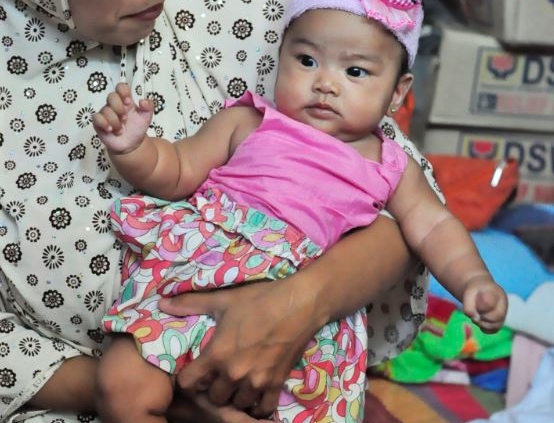
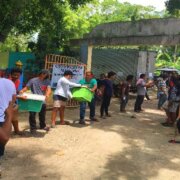
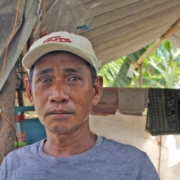
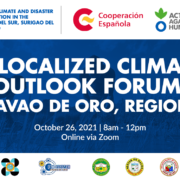
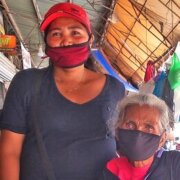
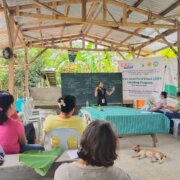
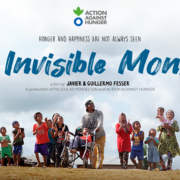
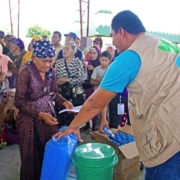




Leave a Reply
Want to join the discussion?Feel free to contribute!